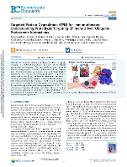Targeted Protein Degradation (TPD) for Immunotherapy: Understanding Proteolysis Targeting Chimera-Driven Ubiquitin-Proteasome Interactions

Autor
Ghosh, Subhrojyoti
Das, Souvadra
Sen, Shinjini
Kumar, Priyanka
Majumdar, Madhurima
Dasgupta, Renesa
Mukherjee, Sampurna
Das, Shrimanti
Ghose, Indrilla
Raja Karuppiah, Muruga Poopathi
Chuturgoon, Anil A.
Anand, Krishnan
Datum vydání
2024Publikováno v
Bioconjugate ChemistryRočník / Číslo vydání
35 (8)ISBN / ISSN
ISSN: 1043-1802ISBN / ISSN
eISSN: 1520-4812Informace o financování
MSM//SVV260663
MSM//EH22_008/0004607
UK/GAUK/GAUK200223
UK/COOP/COOP
Metadata
Zobrazit celý záznamTato publikace má vydavatelskou verzi s DOI 10.1021/acs.bioconjchem.4c00253
Abstrakt
Targeted protein degradation or TPD, is rapidly emerging as a treatment that utilizes small molecules to degrade proteins that cause diseases. TPD allows for the selective removal of disease-causing proteins, including proteasome-mediated degradation, lysosome-mediated degradation, and autophagy-mediated degradation. This approach has shown great promise in preclinical studies and is now being translated to treat numerous diseases, including neurodegenerative diseases, infectious diseases, and cancer. This review discusses the latest advances in TPD and its potential as a new chemical modality for immunotherapy, with a special focus on the innovative applications and cutting-edge research of PROTACs (Proteolysis TArgeting Chimeras) and their efficient translation from scientific discovery to technological achievements. Our review also addresses the significant obstacles and potential prospects in this domain, while also offering insights into the future of TPD for immunotherapeutic applications.
Klíčová slova
Cancer-immunotherapy, Tyrosine Kinase, Protac Degrader, Cell-activation, Achieves safe, Potent, System, Stat3, Identification, Bromodomain
Trvalý odkaz
https://hdl.handle.net/20.500.14178/2603Licence
Licence pro užití plného textu výsledku: Creative Commons Uveďte původ 4.0 International







